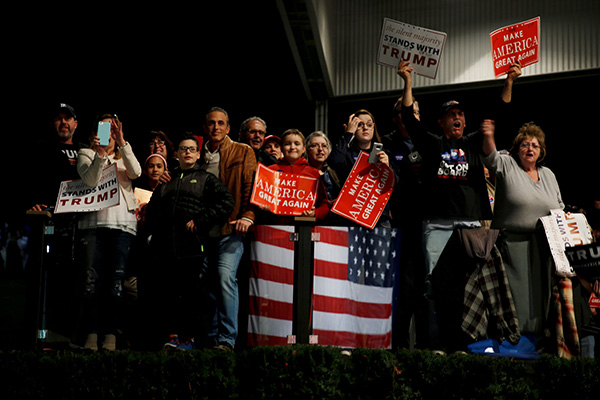
Supporters cheer for Trump at a campaign rally in Detroit, Michigan Nov 6. Most Trump voters are not bigots nor do they fit in ‘a basket of deplorables’. These Americans felt the ground sinking beneath their feet as rising costs of living and lack of employment opportunities in middle-America permeated the rust-belt states with an air of anger, frustration and desperation. — Reuters photo
AROUND a year ago, I was in America to attend an academic institute sponsored by the United States Department of State. There were 21 of us – Southeast Asian students and professionals – selected to undergo a civic engagement and leadership programme. My time in the United States was the definite highlight of my year thus far.
Growing up in my father’s household, I watched more Discovery Channel than ntv7; read more Readers’ Digest than Dewan Siswa; knew more about New York City than Kuala Lumpur. I grew up consuming and digesting American media, literature, and lifestyle, making me believe that America was the ‘promised land’.
I became rather an Americophile, with strong beliefs in free speech, free press and transparent, open democracy. Of course, my fanatical love for America became more rational over the years as I grew aware of its deep flaws, like racism, violence and abuse of human rights. Nevertheless, being able to learn democracy and civic engagement in places such as Washington DC was a galvanising experience. It made me feel America’s role in promoting democratic freedom would be a constant, noble cause. Until Nov 8.
I wasn’t ready for the 2016 US Presidential Elections. Nobody truly was. The race showed me that even the great gilded ‘democratic’ institutions of America were deeply flawed and corrupt. Leaked emails by WikiLeaks and other sources exposed the severity and extent of backroom king-making and nomination fixing inside the Democratic National Committee (DNC). On top of that, this is the first election cycle without the full protection of the Voting Rights Act. Voter suppression and discrimination was rife, as 14 states put in place new voting restrictions for the first time, including crucial swing states like Wisconsin and Virginia. So in effect, hundreds of thousands were restricted in their efforts to cast their ballots. Since when did democracy become so undemocratic?
So I had unequivocal proof that democratic institutions were actually not that democratic after all. Fine, what could make this election cycle even worse? The rise of Trump certainly fits the bill. Initially thought of as a joke, Trump defied all naysayers and opponents by running a divisive, hateful and animalistic campaign.
Trump showed the whole world that America had deep divisions that it tried so desperately to whitewash. But most importantly, his rise to power highlights that large swathes of ordinary Americans have lost faith in establishment politics. Most Trump voters are not bigots nor do they fit in ‘a basket of deplorables’. These Americans felt the ground sinking beneath their feet as rising costs of living and lack of employment opportunities in middle-America permeated the rust-belt states with an air of anger, frustration and desperation.
The liberal progressive left and centralist democrats that Hillary Clinton represented didn’t just disregard the fears of these left-behind Americans, they disrespected their right to support their candidate, Trump.
In the waning months of the election cycle, it was interesting how Trump supporters were targeted and singled-out for shame and ridicule by the liberal left. These events carried echoes of Malaysia’s division, as well. How many of us scoffed and ridiculed the two Red-Shirt protestors who were video-interviewed? How many of us made fun of Datuk Seri Ahmad Zahid Hamidi when he couldn’t speak succinct English with a pretentious British accent? It is alarming that latte-sipping Malaysians who dwell in sprawling urban centres have started to insult and label Malaysians who live in more regional and rural places as being ignorant or uneducated. Disconnect in priorities, beliefs and values are expected between the urban and rural divide but this is something else entirely.
For instance, the backlash from those in Peninsula Malaysia towards Sarawakians who voted for the Barisan Nasional coalition was harrowing. For me, it portrayed a nation divided. Those who voted for Datuk Patinggi Tan Sri Adenan Satem were not ignorant or uneducated, but harboured different fears and frustrations. They found their champion in Adenan, who offered what the people wanted. Surely, the views of the perennially-ignored East Malaysians – who only make up around 19 per cent of the population – mattered less than the other 81 per cent in Peninsular Malaysia. Not so.
If we were to avoid an ugly general election and to alleviate deepening urban-rural divides, liberal, progressive, and urban Malaysians must start to understand and empathise with other Malaysians; they who watch TV3 and eat nasi lemak, unlike many of us who Netflix and enjoy ravioli genovese in Bangsar.
Comments can reach the writer via [email protected].
